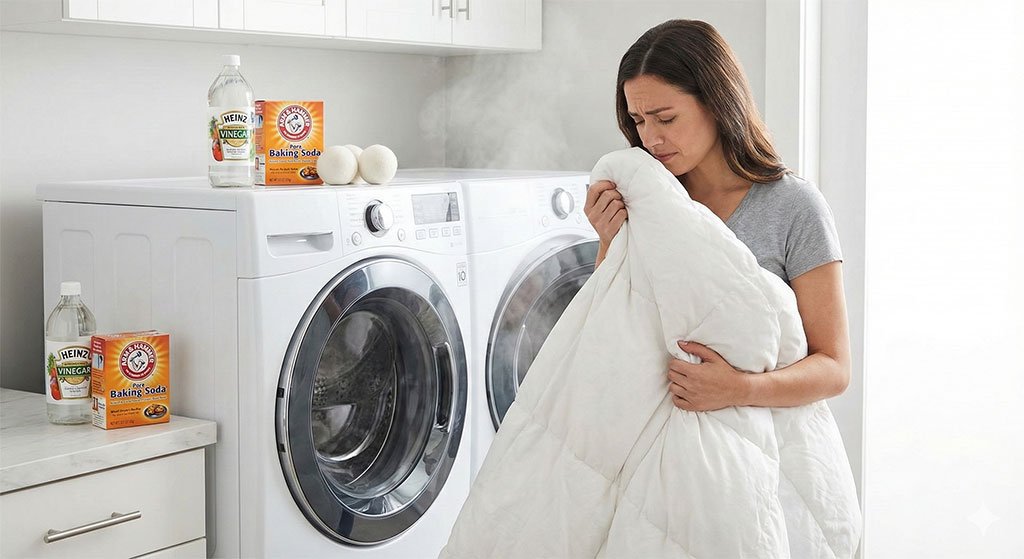You should not use dishwashing liquid soap in a dishwasher. It can create excess suds and cause the appliance to overflow.
Understanding the proper usage of cleaning products ensures both the longevity of your appliances and the effectiveness of your household chores. Traditional dishwashing liquid soap is designed for handwashing dishes, not for the automated environment of a dishwasher. Using the correct detergent is crucial for both the performance of your dishwasher and the cleanliness of your dishes.
This introduction guides homeowners on the importance of using the right products for their appliances to avoid damage and maintain efficiency in their daily cleaning routines. Choosing the appropriate dishwasher detergent is a simple yet essential step in kitchen maintenance, providing peace of mind and sparkling results.
:max_bytes(150000):strip_icc()/regular-dish-soap-in-dishwasher-1907646-01-9c01ca658f5640d8902903c707077682.jpg)
Credit: www.thespruce.com
Table of Contents
The Great Soap Confusion
Ever reached for the dishwashing liquid instead of dishwasher detergent? It’s a common kitchen mix-up. Many believe soaps are interchangeable, but they’re not. Using the wrong one can lead to a foamy, messy disaster. Let’s dive into the main differences and understand the consequences of such a soap blunder.
Differences Between Dish Soap And Dishwasher Detergent
Dish Soap | Dishwasher Detergent |
|---|---|
Designed for hand washing | Specifically for machines |
Suds up quickly | Low-suds formula |
Gentler on skin | Harsher chemicals |
Not as effective in hard water | Formulated for all water types |
Dish soap creates bubbles that hand washing needs. Dishwasher detergent, however, is low-suds and powerful. It targets food residue within dishwashers. Their formulas differ greatly.
Consequences Of Wrong Soap Usage
- Flood of suds: Dish soap creates excessive bubbles. This can overflow, causing a kitchen flood.
- Damaged appliance: A dishwasher can malfunction if the wrong soap is used. It’s not designed to handle too many suds.
- Poor cleaning results: Hand dish soap doesn’t possess the same cleaning power. Dishes come out with grease and residue.
Using dish soap in a dishwasher is a recipe for disaster. It’s important to use the correct soap to prevent damage. The aftermath is messy and potentially costly. Remember, dish soap is for the sink, and dishwasher detergent is for the machine.
:max_bytes(150000):strip_icc()/dishwasher-overflowing-73666533-5a7952c9c06471003787f115.jpg)
Credit: www.thoughtco.com
Chemistry Behind The Soap
Understanding the chemistry of dishwashing soap is vital. The formulation includes various ingredients that work together to clean effectively. The right pH and chemicals ensure your dishes get squeaky clean without damaging the dishwasher.
Formulation Balance
Dishwashing liquid soap and dishwasher detergents have different formulas. The main components of soap include surfactants, enzymes, and fragrances. Together, they cut through grease and food residue. Yet, they must remain gentle on hands. Dishwasher detergent, on the other hand, targets tough food messes. It needs a stronger formula.
- Surfactants work as the cleaning agents.
- Enzymes break down stubborn food particles.
- A well-balanced pH protects the dishwasher’s interior.
Suds Control And Why It Matters
Suds are not a dishwasher’s friend. They can overflow, affecting function and causing potential damage. This is why suds control matters:
- Excessive suds can lead to dishwasher leaks.
- They may result in dishes not rinsing properly.
- Low-sudsing formulas are necessary for machine efficiency.
In dishwashers, the detergents are low foaming. They must avoid suds to ensure clean dishes and a tidy machine. Dishwashing liquid soap, however, produces more foam. This can lead to an overflow. Always use the correct type of soap in your dishwasher for the best results.
Accidental Soap Invasion
Picture this: a busy day, dishes piled high, and in a quick moment of distraction, dishwashing liquid soap ends up in the dishwasher. This mistake can lead to a bubbly situation known as ‘Accidental Soap Invasion’. Panic and mess often follow. Luckily, there are steps to take to control the mayhem.
Immediate Steps To Mitigate Damage
Stop the machine right away. Act fast; every second counts. Hit ‘cancel’ or ‘drain’ on the dishwasher panel. Next, scoop out the soap and any water inside. Use towels to clean up any overspill.
- Remove dishes and rinse them under running water.
- Wipe down the dishwasher interior to remove excess soap.
- Aerate the room by opening windows or turning on a fan.
Follow these steps diligently to minimize damage and avoid further problems.
Long-term Effects On Dishwasher
Using dishwashing liquid in your dishwasher might not just make a one-time mess; it can lead to more serious issues. Dishwashing liquid is not designed for dishwashers and can cause problems to your machine.
Issue | Possible Outcome |
|---|---|
Foam Overload | Can cause leaks and motor damage. |
Residue Build-up | Can block filters and spray arms. |
Internal Part Corrosion | May corrode parts, leading to expensive repairs. |
Regular maintenance is key to keep your dishwasher healthy. Always use recommended dishwasher detergents to prevent these issues.
Unintended Consequences
The idea of substituting your usual dishwasher detergent with dishwashing liquid soap might seem harmless. It’s essential to understand the repercussions of such a decision. When dishwashing liquid meant for hand washing dishes ends up in a dishwasher, the results can be less than desirable.
Flooded Kitchens: A Common Scenario
Imagine stepping into your kitchen only to find it flooded with soap suds and water. This nightmare is common for those who use dishwashing liquid in their dishwashers. Dishwashing liquid produces more suds than your dishwasher is designed to handle. Subsequently, soap suds overflow, leading to possible water damage and the hassle of a time-consuming cleanup.
Impact On Dishware And Appliance
- Dishware Damage: Harsh liquid soap can dull the shine of glassware and degrade dishware material.
- Appliance Wear: The excess suds and foam can strain the dishwasher’s pump and filters, leading to repairs or replacements sooner than expected.
Alternative Cleaning Solutions
Stuck without your regular dishwasher detergent? Fear not! A quick dive into alternative cleaning solutions can save the day. Learn about natural and commercial replacements right here. Remember, while dishwashing liquid can create suds overflow in a dishwasher, other options exist for clean dishes without the mess.
Natural Substitutes During Emergencies
Running out of dishwasher detergent doesn’t spell disaster. Use items from your pantry to keep dishes sparkling. Baking soda and vinegar work wonders together. Here’s a quick guide:
- Baking Soda: A natural abrasive, it scrubs away food particles.
- White Vinegar: Vinegar can break down residues and deodorize.
Merely add a tablespoon of baking soda and a small cup of vinegar to the dishwasher’s detergent cup. This combo handles a full load with ease.
Commercial Alternatives
In the cleaning aisle, several commercial alternatives do the trick. Look for labels reading “dishwasher safe.” These include:
Type of Alternative | Benefits |
|---|---|
Eco-Friendly Pods | Reduce environmental impact |
All-in-One Tablets | Convenience with added rinse aids |
Powdered Dishwasher Detergent | Control over the amount used |
Ensure any alternative chosen is designed for dishwasher use. This prevents potential issues like too many suds or damage to dishes and machine.
Cleaning Hacks Debunked
Myths around cleaning swarm the internet like bees around honey. The kitchen, being the heart of many homes, often becomes the battleground for tried-and-tested, well-meaning but misguided hacks. Let’s debunk some common dishwashing myths and reveal what actually works when it comes to keeping dishes spotless.
Myths About Dishwashing
Using dishwashing liquid soap in a dishwasher is a no-go. Why? Dishwashers and dishwashing liquid soaps are not compatible. Here’s why:
- Dishwashing liquid foams much more than its dishwasher detergent counterpart.
- Excessive foam can damage the dishwasher’s mechanism.
- Overflowing suds may lead to leaks and kitchen mishaps.
To avoid a soap sud disaster, always use detergent designed for dishwashers.
The Truth About Vinegar And Baking Soda
Vinegar and baking soda have been hailed as the ultimate cleaning duo. But do they work wonders in a dishwasher?
Vinegar | Baking Soda |
|---|---|
Removes limescale and freshens the machine.Place a cup of white vinegar on the top rack during a hot wash cycle. | Deodorizes and cleans the interior.Sprinkle a cup at the bottom and run a hot wash cycle. |
While vinegar and baking soda can improve cleanliness, they don’t replace dishwasher detergent. Use them to maintain your dishwasher occasionally while relying on a proper detergent for the dirty work.
Maintaining Dishwasher Health
Maintaining Dishwasher Health is crucial for both performance and longevity. Using dishwashing liquid soap in a dishwasher often leads to suds overload. This can harm your machine. It’s vital to follow proper maintenance practices. This ensures a clean, functioning dishwasher. Let’s explore regular upkeep and how to spot any warning signs.
Regular Maintenance Practices
Regular inspections and cleanings keep dishwashers running smoothly.
- Clean filters – Remove and rinse regularly.
- Inspect spray arms – Keep free from blockages.
- Run empty cycles with special cleaner – Do this monthly.
- Check and clean seals – Prevent leaks and damage.
Recognizing Signs Of Dishwasher Distress
Dishwashers will show trouble signs. Quick action can prevent further issues.
Sign of Distress | Action Required |
|---|---|
Water Spots | Use rinse aid. |
Dishes Not Clean | Check spray arms and filters. |
Unusual Noises | Inspect for loose items inside. |
Excess Suds | Stop using dishwashing liquid soap. |

Credit: www.reddit.com
Staying Informed
Staying informed is key when considering what products are safe to use in your appliances. Dishwashers are no exception, and using the wrong detergent can lead to problems. Before you grab that bottle of dishwashing liquid soap, learn why it might not be the best choice for your dishwasher.
Reading Labels
Labels on dishwashing products contain crucial information. They guide you on proper usage. Always look for “dishwasher safe” or similar phrases.
- Ingredients: identify what the product contains.
- Instructions: follow these closely to avoid damage.
- Warnings: heed these to prevent mishaps.
Knowing Your Appliance’s Needs
Every dishwasher has specific requirements. Using incorrect soap can cause problems.
Appliance Feature | Requirement |
|---|---|
Soap Dispenser Size | Limits detergent amount. |
Water Usage | Affects sudsing level needed. |
Cleaning Mechanism | Designed for specific soap types. |
Frequently Asked Questions
Can I Use Dishwashing Liquid In The Dishwasher?
No, you should not use dishwashing liquid in a dishwasher. It can cause suds to overflow and may damage the machine. Always use detergent designed for dishwashers.
What Is A Good Substitute For Dishwasher Soap?
A good substitute for dishwasher soap is baking soda mixed with a drop of liquid dish soap. Alternatively, use white vinegar as a natural cleaning agent.
Is Dishwashing Liquid The Same As Dish Soap?
Dishwashing liquid and dish soap generally refer to the same cleaning product used for hand washing dishes. They effectively remove grease and food residues.
Can You Run A Dishwasher Without Detergent?
Yes, you can run a dishwasher without detergent for a simple rinse. But for effectively cleaning dishes, using detergent is essential.
Bottom Line
Using dishwashing liquid soap in a dishwasher is a no-go. The risks far outweigh any temporary benefits, from suds overflow to potential damage. Stick with recommended dishwasher detergents to ensure your dishes sparkle and your machine runs smoothly.
Keep your kitchen mess-free and appliance-friendly with the right soap.


